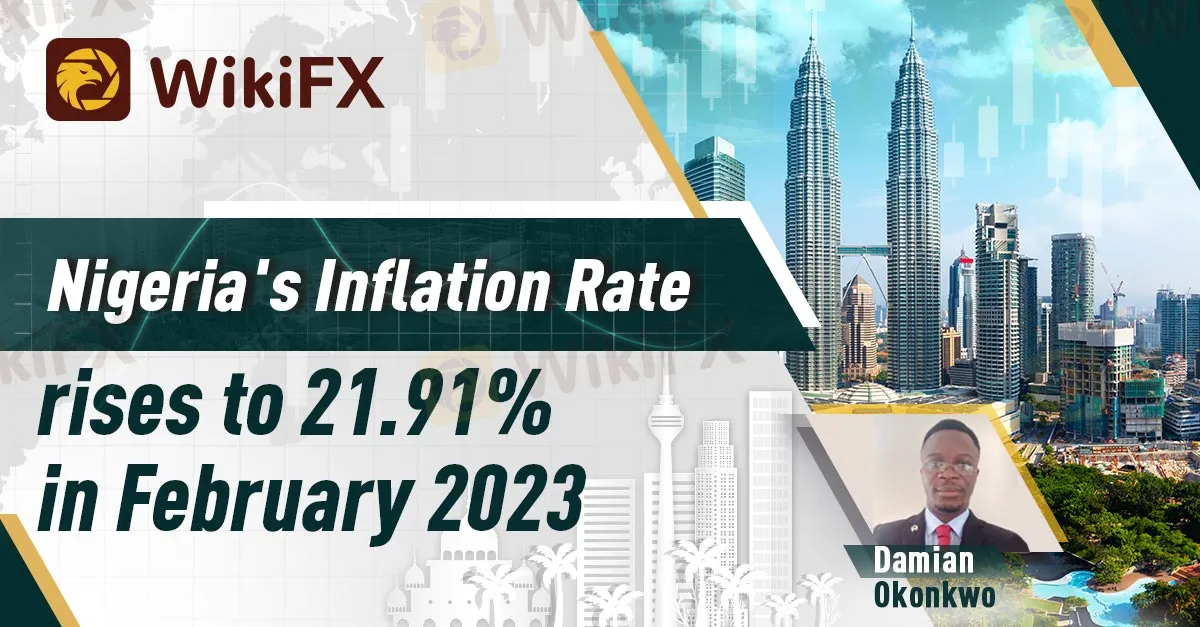简体中文
繁體中文
English
Pусский
日本語
ภาษาไทย
Tiếng Việt
Bahasa Indonesia
Español
हिन्दी
Filippiiniläinen
Français
Deutsch
Português
Türkçe
한국어
العربية
Nigeria's Inflation Rate rises to 21.91% in February 2023
Abstract:Nigeria's inflation rate increased to 21.91% in February marking a second consecutive increase since 2023.

By: Damian Okonkwo

Nigerias inflation rate has continued its upward trajectory, rising to 21.91% in February 2023, according to data released by the National Bureau of Statistics (NBS) last week.
This marks the second consecutive month that the inflation rate has risen, and it is the highest it has been since April 2018. In January 2023, the inflation rate stood at 21.82 last month, indicating an increase of 0.09 percent. This is based on the information disclosed by the National Bureau of Statistics, NBS, last week's Wednesday.
On a year-on-year (YoY) basis, the inflation rate was 6.21 percent higher compared to the rate recorded in February 2022, which stood at 15.7 percent.
The higher increase in inflation was driven by the increase in food prices. The food inflation rate rose to 24.35 percent on a YoY basis in February which is 7.24 percent higher compared to the rate recorded in February 2022 when it stood at 17.1 percent.
The NBS attributed the rise in food prices to a combination of factors, including supply chain disruptions caused by insecurity in some parts of the country, as well as the high cost of transportation.
The core inflation rate, which excludes the prices of volatile agricultural produce, also increased to 16.56% in February 2023, compared to 16.05% in January 2023. This indicates that the rise in inflation is not solely driven by food prices but is also a reflection of higher prices across other sectors of the economy.
The persistent rise in inflation is a cause for concern for Nigerians, as it erodes the purchasing power of consumers and makes it more difficult for businesses to operate. It also puts pressure on the Central Bank of Nigeria (CBN) to take action to address the issue.
The CBN has been taking measures to curb inflation, including raising interest rates and implementing policies to support local production and reduce imports. However, these measures have yet to have a significant impact on inflation.

Disclaimer:
The views in this article only represent the author's personal views, and do not constitute investment advice on this platform. This platform does not guarantee the accuracy, completeness and timeliness of the information in the article, and will not be liable for any loss caused by the use of or reliance on the information in the article.
Read more

Turkey Resumes Rate Cuts Amid Easing Inflation
Turkey’s inflation has eased, prompting the central bank to resume interest rate cuts. Striking a balance between economic recovery and inflation control has become a critical focus. However, significant challenges lie ahead, as Turkey continues to navigate complex economic conditions.

New Year, New Surge: Will Oil Prices Keep Rising?
As of the writing of this article (January 2), oil prices stand at $71.88 per barrel. Investors need to continue monitoring whether the supply and demand dynamics will continue to push prices further up.

Bursa Malaysia Dips as Investors Brace for 2025 Uncertainty
Bursa Malaysia saw a slight dip on the final trading day of the year as profit-taking and cautious sentiment dominated. The FBM KLCI declined 3.4 points to 1,634.28, with muted turnover of RM822.07 million due to year-end festivities. Blue-chip stocks, including Tenaga Nasional and Telekom Malaysia, experienced declines, while regional markets remained subdued amid global uncertainties. As 2024 approaches, investors remain cautious, balancing risks with potential opportunities.

Will the Fed Cut Rates in 2025? What to Expect
The Federal Reserve has implemented multiple interest rate cuts in 2024, bringing the rate to a range of 4.25%-4.5% by the end of the year. However, whether the Fed will continue cutting rates or shift to rate hikes in 2025 remains uncertain. The Fed's policy direction depends not only on economic data but also on internal adjustments, the policy direction of the new president, and other factors.
WikiFX Broker
Latest News
Think Before You Click: Malaysian Loses RM240,000 to Investment Scam
Ghana Trader Jailed for $300K Forex and Crypto Scam
US Dollar Surge Dominates Forex Market
Hong Kong Police Bust Deepfake Crypto Scam Syndicate Involving $34 Million
Is it a good time to buy Korean Won with the current depreciation?
Lawsuit Filed Against PayPal Over Honey’s Affiliate Fraud
What Are The Top 5 Cryptocurrency Predictions For 2025?
BlackRock Bitcoin ETF Outflows Hit $332M in Single Day
XRP Price Prediction for 2025: Will It Hit $4.30 or More?
Exnova Scam Alert: Account Blocked, Funds Stolen, and Zero Accountability
Currency Calculator






